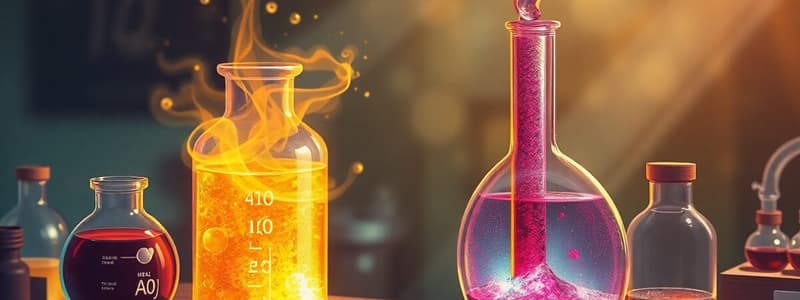Podcast
Questions and Answers
Vanilla essence and clove oil can be used to check their ______.
Vanilla essence and clove oil can be used to check their ______.
odour
Dilute ______ solution is used in one test tube to test the change in odour.
Dilute ______ solution is used in one test tube to test the change in odour.
HCl
Vanilla, onion and clove can be used as ______ indicators.
Vanilla, onion and clove can be used as ______ indicators.
olfactory
Dilute sulphuric acid is added to zinc ______ in Activity 2.3.
Dilute sulphuric acid is added to zinc ______ in Activity 2.3.
The gas being evolved through the soap solution is ______.
The gas being evolved through the soap solution is ______.
Bubbles are formed in the soap solution because of ______.
Bubbles are formed in the soap solution because of ______.
A burning ______ is taken near a gas filled bubble.
A burning ______ is taken near a gas filled bubble.
Activity 2.3 can be repeated with acids like HCl, HNO3, and ______.
Activity 2.3 can be repeated with acids like HCl, HNO3, and ______.
Acids and ______ react with metals.
Acids and ______ react with metals.
Vanilla essence and clove oil can have their odors affected by reactions with dilute HCl and dilute ______ solutions.
Vanilla essence and clove oil can have their odors affected by reactions with dilute HCl and dilute ______ solutions.
Substances like vanilla, onion, and clove that can indicate the presence of an acid or a base by a change in smell are known as ______ indicators.
Substances like vanilla, onion, and clove that can indicate the presence of an acid or a base by a change in smell are known as ______ indicators.
In the reaction between dilute sulfuric acid and zinc granules, the gas that evolves and produces bubbles in soap solution is identified as ______.
In the reaction between dilute sulfuric acid and zinc granules, the gas that evolves and produces bubbles in soap solution is identified as ______.
During the experiment with zinc granules and sulfuric acid, the formation of bubbles in the soap solution confirms the production of a ______.
During the experiment with zinc granules and sulfuric acid, the formation of bubbles in the soap solution confirms the production of a ______.
The burning candle test performed on the gas-filled bubbles from the reaction of zinc and sulfuric acid confirms the presence of hydrogen through a ______ sound.
The burning candle test performed on the gas-filled bubbles from the reaction of zinc and sulfuric acid confirms the presence of hydrogen through a ______ sound.
When testing the evolved gas with a burning candle, a 'pop' sound indicates the presence of ______ gas.
When testing the evolved gas with a burning candle, a 'pop' sound indicates the presence of ______ gas.
The reaction between an acid and a metal results in the release of hydrogen gas and the formation of a metallic ______.
The reaction between an acid and a metal results in the release of hydrogen gas and the formation of a metallic ______.
In the experiment testing how acids and bases react with metals, the acids used include hydrochloric acid, nitric acid and ______ acid.
In the experiment testing how acids and bases react with metals, the acids used include hydrochloric acid, nitric acid and ______ acid.
Acids react with metals to produce a metallic salt and ______ gas.
Acids react with metals to produce a metallic salt and ______ gas.
The set up in Figure 2.1 is designed to observe the reaction of zinc granules with dilute ______ acid and to test the gas produced.
The set up in Figure 2.1 is designed to observe the reaction of zinc granules with dilute ______ acid and to test the gas produced.
The experiment with vanilla essence and clove oil aims to identify substances that can serve as ______ indicators.
The experiment with vanilla essence and clove oil aims to identify substances that can serve as ______ indicators.
In the reaction between dilute sulfuric acid and zinc granules, the gas evolved is identified as ______ by testing with a burning candle.
In the reaction between dilute sulfuric acid and zinc granules, the gas evolved is identified as ______ by testing with a burning candle.
The purpose of passing the evolved gas through soap solution in Activity 2.3 is to create ______, which help in safely testing the gas' flammability.
The purpose of passing the evolved gas through soap solution in Activity 2.3 is to create ______, which help in safely testing the gas' flammability.
When acids react with metals, they typically produce a ______ and a salt.
When acids react with metals, they typically produce a ______ and a salt.
The reaction between acids and metals demonstrates a ______ property of acids.
The reaction between acids and metals demonstrates a ______ property of acids.
The presence of bubbles forming when gas is passed through a soap solution indicates that a ______ is being produced during a chemical reaction.
The presence of bubbles forming when gas is passed through a soap solution indicates that a ______ is being produced during a chemical reaction.
The caution advised in Activity 2.3 highlights that the experiment requires ______'s assistance due to the potential hazards involved.
The caution advised in Activity 2.3 highlights that the experiment requires ______'s assistance due to the potential hazards involved.
The testing of evolved gas with a burning candle is a method to confirm the presence of ______ gas.
The testing of evolved gas with a burning candle is a method to confirm the presence of ______ gas.
The observation differences when using various acids like HCl, HNO3, and CH3COOH in Activity 2.3 implies that reaction rates can vary based on acid ______.
The observation differences when using various acids like HCl, HNO3, and CH3COOH in Activity 2.3 implies that reaction rates can vary based on acid ______.
The reaction of acids with metals results in the displacement of ______ from the acid.
The reaction of acids with metals results in the displacement of ______ from the acid.
In the context of olfactory indicators, the alteration in perceived scent when vanilla essence interacts with dilute HCl and NaOH solutions is predicated on interactions affecting the ______ responsible for the characteristic aroma.
In the context of olfactory indicators, the alteration in perceived scent when vanilla essence interacts with dilute HCl and NaOH solutions is predicated on interactions affecting the ______ responsible for the characteristic aroma.
When testing the evolved gas from the reaction between Zinc granules and dilute sulfuric acid ($H_2SO_4$) with a burning candle, the immediate ignition and subsequent 'pop' sound are direct indicators of the formation of ______, confirming the acid-metal reaction.
When testing the evolved gas from the reaction between Zinc granules and dilute sulfuric acid ($H_2SO_4$) with a burning candle, the immediate ignition and subsequent 'pop' sound are direct indicators of the formation of ______, confirming the acid-metal reaction.
From a chemical perspective, the generation of bubbles when passing the gas evolved from the reaction of dilute sulphuric acid and zinc granules through soap solution is due to the decreased ______ of the generated gas in the aqueous environment of the soap solution.
From a chemical perspective, the generation of bubbles when passing the gas evolved from the reaction of dilute sulphuric acid and zinc granules through soap solution is due to the decreased ______ of the generated gas in the aqueous environment of the soap solution.
When diverse acids like HCl, $HNO_3$, and $CH_3COOH$ react with metallic zinc, the observation of effervescence is contingent upon the ______ of the acid influencing the rate of hydrogen gas generation.
When diverse acids like HCl, $HNO_3$, and $CH_3COOH$ react with metallic zinc, the observation of effervescence is contingent upon the ______ of the acid influencing the rate of hydrogen gas generation.
The effervescence observed during the reaction of zinc granules with dilute sulphuric acid fundamentally represents the expulsion of ______ from the reaction milieu.
The effervescence observed during the reaction of zinc granules with dilute sulphuric acid fundamentally represents the expulsion of ______ from the reaction milieu.
The use of clove oil as an olfactory indicator hinges upon the susceptibility of ______, present in clove oil, to react with both acidic and basic media, thereby altering its aromatic profile by interacting with active hydrogen atoms.
The use of clove oil as an olfactory indicator hinges upon the susceptibility of ______, present in clove oil, to react with both acidic and basic media, thereby altering its aromatic profile by interacting with active hydrogen atoms.
The olfactory distinction observed when vanilla essence is introduced to separate test tubes containing dilute HCl and dilute NaOH solutions is contingent on the differential ______ mechanisms occurring in the respective acidic and basic environments.
The olfactory distinction observed when vanilla essence is introduced to separate test tubes containing dilute HCl and dilute NaOH solutions is contingent on the differential ______ mechanisms occurring in the respective acidic and basic environments.
The reaction between dilute sulfuric acid ($H_2SO_4$) and zinc granules yields zinc sulfate ($ZnSO_4$) and dihydrogen gas ($H_2$); the ______ of this process can be described through electrochemical considerations involving standard electrode potentials.
The reaction between dilute sulfuric acid ($H_2SO_4$) and zinc granules yields zinc sulfate ($ZnSO_4$) and dihydrogen gas ($H_2$); the ______ of this process can be described through electrochemical considerations involving standard electrode potentials.
From a chemical kinetics perspective, the generation rate of hydrogen gas during the reaction of dilute hydrochloric acid (HCl) with zinc granules is profoundly influenced by ______, potentially necessitating adjustments to control or optimize the reaction.
From a chemical kinetics perspective, the generation rate of hydrogen gas during the reaction of dilute hydrochloric acid (HCl) with zinc granules is profoundly influenced by ______, potentially necessitating adjustments to control or optimize the reaction.
In the standard setup for testing evolved gases, the soap solution serves as a ______, allowing for enhanced visibility and controlled combustion of generated hydrogen gas.
In the standard setup for testing evolved gases, the soap solution serves as a ______, allowing for enhanced visibility and controlled combustion of generated hydrogen gas.
Vanilla essence and clove oil can have their odors checked to see if they change when reacted with dilute ______ and dilute NaOH solutions.
Vanilla essence and clove oil can have their odors checked to see if they change when reacted with dilute ______ and dilute NaOH solutions.
The experiment tests the change in the odour of clove oil with dilute HCl and dilute ______ solutions.
The experiment tests the change in the odour of clove oil with dilute HCl and dilute ______ solutions.
Vanilla, onion, and clove can be used as ______ indicators based on observations of their reactions with acids and bases.
Vanilla, onion, and clove can be used as ______ indicators based on observations of their reactions with acids and bases.
In Activity 2.3, the apparatus is set up to observe the reaction between dilute sulphuric acid and ______ granules.
In Activity 2.3, the apparatus is set up to observe the reaction between dilute sulphuric acid and ______ granules.
The gas evolved during the reaction of zinc with dilute sulphuric acid is passed through a ______ solution to create bubbles.
The gas evolved during the reaction of zinc with dilute sulphuric acid is passed through a ______ solution to create bubbles.
Burning a gas-filled bubble produced from the reaction of an acid with a metal confirms the presence of ______ gas.
Burning a gas-filled bubble produced from the reaction of an acid with a metal confirms the presence of ______ gas.
Activity 2.3 involves testing various acids, including HCl, HNO3, and ______, to observe their reactions with metals.
Activity 2.3 involves testing various acids, including HCl, HNO3, and ______, to observe their reactions with metals.
The formation of bubbles in the soap solution during the reaction of an acid with a metal is due to the evolution of a ______.
The formation of bubbles in the soap solution during the reaction of an acid with a metal is due to the evolution of a ______.
The reaction of dilute sulphuric acid with zinc granules results in the displacement of hydrogen and the formation of zinc ______.
The reaction of dilute sulphuric acid with zinc granules results in the displacement of hydrogen and the formation of zinc ______.
If the change in enthalpy, $\Delta H$, for the reaction of an acid with a metal is ______, the reaction is exothermic, releasing heat into the surroundings.
If the change in enthalpy, $\Delta H$, for the reaction of an acid with a metal is ______, the reaction is exothermic, releasing heat into the surroundings.
Vanilla essence and clove oil are tested for changes in ______ when mixed with dilute HCl and dilute NaOH solutions.
Vanilla essence and clove oil are tested for changes in ______ when mixed with dilute HCl and dilute NaOH solutions.
The reaction between dilute sulfuric acid and zinc granules produces bubbles, which are then tested using a ______ solution.
The reaction between dilute sulfuric acid and zinc granules produces bubbles, which are then tested using a ______ solution.
When a burning candle is brought near a gas-filled bubble produced from the reaction of an acid and a metal, the observation provides clues about the identity of the ______.
When a burning candle is brought near a gas-filled bubble produced from the reaction of an acid and a metal, the observation provides clues about the identity of the ______.
In the experiment with acids and zinc granules, the ______ of bubbles in the soap solution indicates a gas is being evolved.
In the experiment with acids and zinc granules, the ______ of bubbles in the soap solution indicates a gas is being evolved.
The activity involving acids reacting with metals requires the teacher’s ______ due to the potential hazards of handling acids and flammable gases.
The activity involving acids reacting with metals requires the teacher’s ______ due to the potential hazards of handling acids and flammable gases.
Olfactory indicators like vanilla, onion, and clove are substances that help identify whether a solution is acidic or basic based on changes in their ______.
Olfactory indicators like vanilla, onion, and clove are substances that help identify whether a solution is acidic or basic based on changes in their ______.
The chemical formula for dilute sulfuric acid used in the reaction with zinc granules is ______.
The chemical formula for dilute sulfuric acid used in the reaction with zinc granules is ______.
In testing the gas produced from the reaction of zinc and sulfuric acid, the 'pop' sound upon ignition is definitive evidence of ______'s presence.
In testing the gas produced from the reaction of zinc and sulfuric acid, the 'pop' sound upon ignition is definitive evidence of ______'s presence.
The general equation representing the reaction between a metal (M) and an acid (HX) to produce a salt and hydrogen gas can be represented as: $M + nHX \rightarrow MX_n + ______$
The general equation representing the reaction between a metal (M) and an acid (HX) to produce a salt and hydrogen gas can be represented as: $M + nHX \rightarrow MX_n + ______$
The change in odour of clove oil when reacted with dilute HCl and NaOH is predicated on the presence of ______ compounds within the oil reacting with the respective reagent, resulting in detectable volatile byproducts.
The change in odour of clove oil when reacted with dilute HCl and NaOH is predicated on the presence of ______ compounds within the oil reacting with the respective reagent, resulting in detectable volatile byproducts.
Flashcards
Olfactory Indicators
Olfactory Indicators
Substances that change their smell in acidic or basic environments.
Vanilla Essence
Vanilla Essence
A fragrant substance tested as an olfactory indicator.
Clove Oil
Clove Oil
A fragrant oil tested for changes in odour with acids/base.
Hydrochloric Acid (HCl)
Hydrochloric Acid (HCl)
Signup and view all the flashcards
Sodium Hydroxide (NaOH)
Sodium Hydroxide (NaOH)
Signup and view all the flashcards
Chemical Reaction with Metals
Chemical Reaction with Metals
Signup and view all the flashcards
Zinc Granules
Zinc Granules
Signup and view all the flashcards
Hydrogen Gas
Hydrogen Gas
Signup and view all the flashcards
Dilute Sulphuric Acid
Dilute Sulphuric Acid
Signup and view all the flashcards
Observations
Observations
Signup and view all the flashcards
Olfactory Indicators Test
Olfactory Indicators Test
Signup and view all the flashcards
Dilute Vanilla Essence
Dilute Vanilla Essence
Signup and view all the flashcards
Odour Change Observation
Odour Change Observation
Signup and view all the flashcards
Acids Testing with Zinc
Acids Testing with Zinc
Signup and view all the flashcards
Gas Produced in Reaction
Gas Produced in Reaction
Signup and view all the flashcards
Burning Candle Test
Burning Candle Test
Signup and view all the flashcards
Hydrochloric Acid Testing
Hydrochloric Acid Testing
Signup and view all the flashcards
Observing Zinc Surface
Observing Zinc Surface
Signup and view all the flashcards
Comparative Acid Testing
Comparative Acid Testing
Signup and view all the flashcards
Clove Oil Testing
Clove Oil Testing
Signup and view all the flashcards
Vanilla Essence Testing
Vanilla Essence Testing
Signup and view all the flashcards
Olfactory Indicator Capability
Olfactory Indicator Capability
Signup and view all the flashcards
Zinc and Sulphuric Acid Reaction
Zinc and Sulphuric Acid Reaction
Signup and view all the flashcards
Hydrogen Gas Detection
Hydrogen Gas Detection
Signup and view all the flashcards
Acid and Metal Reaction
Acid and Metal Reaction
Signup and view all the flashcards
Dilute Acid Types
Dilute Acid Types
Signup and view all the flashcards
Soap Solution Bubbling
Soap Solution Bubbling
Signup and view all the flashcards
Acid Observation Variability
Acid Observation Variability
Signup and view all the flashcards
Observation Recording
Observation Recording
Signup and view all the flashcards
Effect of Dilute HCl
Effect of Dilute HCl
Signup and view all the flashcards
Effect of Dilute NaOH
Effect of Dilute NaOH
Signup and view all the flashcards
Chemical Property of Acids
Chemical Property of Acids
Signup and view all the flashcards
Zinc Reaction Observations
Zinc Reaction Observations
Signup and view all the flashcards
Bubbling in Soap Solution
Bubbling in Soap Solution
Signup and view all the flashcards
Comparative Acid Experiment
Comparative Acid Experiment
Signup and view all the flashcards
Observing Odour Changes
Observing Odour Changes
Signup and view all the flashcards
Vanilla and Clove in Acids
Vanilla and Clove in Acids
Signup and view all the flashcards
Hydrogen Gas Formation
Hydrogen Gas Formation
Signup and view all the flashcards
Observations with Clove Oil
Observations with Clove Oil
Signup and view all the flashcards
Dilute Sodium Hydroxide Reaction
Dilute Sodium Hydroxide Reaction
Signup and view all the flashcards
Role of Zinc in Acid Reaction
Role of Zinc in Acid Reaction
Signup and view all the flashcards
Dilute Hydrochloric Acid Reaction
Dilute Hydrochloric Acid Reaction
Signup and view all the flashcards
Bubbles in Soap Solution
Bubbles in Soap Solution
Signup and view all the flashcards
Chemical Indicator Experiment
Chemical Indicator Experiment
Signup and view all the flashcards
Test Tube Observations
Test Tube Observations
Signup and view all the flashcards
Reaction of Zinc with Dilute Acids
Reaction of Zinc with Dilute Acids
Signup and view all the flashcards
Olfactory Indicators Testing
Olfactory Indicators Testing
Signup and view all the flashcards
Reaction with Dilute Acids
Reaction with Dilute Acids
Signup and view all the flashcards
Gas Evolution Observation
Gas Evolution Observation
Signup and view all the flashcards
Olfactory Change with Acids
Olfactory Change with Acids
Signup and view all the flashcards
Burning Candle Test Purpose
Burning Candle Test Purpose
Signup and view all the flashcards
Comparative Acid Reaction
Comparative Acid Reaction
Signup and view all the flashcards
Bubbles from Hydrogen Gas
Bubbles from Hydrogen Gas
Signup and view all the flashcards
Zinc Granules Behavior
Zinc Granules Behavior
Signup and view all the flashcards
Observation Documentation
Observation Documentation
Signup and view all the flashcards
Effect of Acids on Odour
Effect of Acids on Odour
Signup and view all the flashcards
Study Notes
Acid-Base Reactions with Metals
- To test for reactions, rinse cloth strips with water, and check their odour. Then check the odour of dilute vanilla and clove oil.
- Dilute HCl and NaOH solutions are added to test tubes; vanilla and clove oil are added to each test tube.
- Changes in odour are recorded when the solutions are mixed.
- Substances like vanilla, onion, and clove can be used as olfactory indicators based on observations.
How Acids and Bases React with Metals - Activity 2.3
- Caution: Teacher assistance required for this activity.
- Set up the apparatus like in Figure 2.1.
- Add 5 mL of dilute sulphuric acid to a test tube, then add zinc granules.
- Observe the zinc granules' surface for any changes (e.g. bubbling, dissolving or gas formation). Note the type of bubbling observed (is it uniform or localized around the granules?).
- Allow the evolved gas to pass through soap solution to observe gas bubbles.
- Bubbles will form in the soap solution due to the gas (hydrogen).
- Bring a lit candle near the gas bubble and observe the pop sound caused by burning hydrogen.
- Repeat the activity with other acids (e.g., HCl, HNO3, CH3COOH) and note any observed differences. Observe if the observations are similar or different for each acid.
Studying That Suits You
Use AI to generate personalized quizzes and flashcards to suit your learning preferences.




